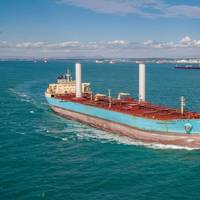Sails and Satellite Navigation Could Cut Shipping Industry’s Emissions By Up to a Third

In the vast expanse of the world’s oceans, a transformation is underway.The international shipping sector, made up of thousands of massive cargo ships laden with many of the goods we buy, emits carbon dioxide (CO₂) roughly equivalent to the entire country of Germany.Our research emphasises the need for immediate action. Reducing shipping emissions by 34% by 2030 is necessary to stay on course with the Paris Agreement’s 1.5°C goal. But with low-carbon fuel pipelines unlikely to be available at the necessary scale until at least the 2030s…
EU Pulls Plug on Back-Up Nav System
A British-led initiative to create a back-up to satellite navigation systems for ships has been pulled after failing to garner interest from other European countries, despite its proponents pointing to the growing risk of disasters at sea. Vessels increasingly rely on devices that employ satellite signals to find a location or keep exact time, including the Global Positioning System (GPS). Paper charts are used less frequently due to a loss of traditional skills among seafarers. Experts say GPS is vulnerable to signal loss from solar weather effects or radio and satellite interference or deliberate jamming, which South Korea experienced from North Korea in recent years.
Sovcomflot & Sakhalin Energy to Provide 3 Icebreakers for Sakhalin-2
SCF Group (Sovcomflot) and Sakhalin Energy Investment Company Ltd. (Sakhalin Energy) have signed a contract for the construction and long-term operation of three multifunctional icebreaking standby vessels to serve the Sakhalin-2 offshore energy platforms. The contract covers a 20 year term, during which the vessels will provide safe and reliable services for Sakhalin Energy’s platforms in the Sea of Okhotsk. The vessels will also assist with accommodation of the offshore facilities personnel. In an emergency, the vessels will help evacuate personnel from the offshore platforms and will provide oil spill response services when necessary.
Sovcomflot Extends Cooperation with Sakhalin Energy
Companies sign agreements for long-term operation of three vessels for the Sakhalin-2 project. SCF Group (Sovcomflot) and Sakhalin Energy Investment Company Ltd. have signed a contract for the construction and long-term operation of three multifunctional icebreaking standby vessels to serve the Sakhalin-2 offshore energy platforms. The contract covers a 20 year term, during which the vessels will provide safe and reliable services for Sakhalin Energy’s platforms in the Sea of Okhotsk. The vessels will also assist with accommodation of the offshore facilities personnel. In an emergency, the vessels will help evacuate personnel from the offshore platforms and will provide oil spill response services when necessary.
Europe Grapples with Threat of Ships Sailing Blind
Europe has yet to fully wake up to the danger of maritime disasters caused by signal jamming and blackouts of satellite navigation devices, say the proponents of a back up system on trial in British and Dutch ports. Ships increasingly rely on systems that employ satellite signals to find a location or keep exact time including the Global Positioning System (GPS) and GLONASS. But experts say such systems are vulnerable to signal loss from solar weather effects or radio and satellite interference and can also be affected by intentional jamming by criminal gangs, nation states or potentially from militant groups. The General Lighthouse Authorities of the UK and Ireland (GLA) is pioneering a radio-based back-up prototype called eLoran.
Safer Navigation with International Standards for Electronic Systems

Carrying an estimated 90% of world trade and billions of passengers every year, international shipping represents the life blood of the global economy. Safety, always a major concern for seafarers, has made huge advances in the last century. However, the massive increase in traffic in recent decades requires, among other things, new or better global communication and navigation solutions resting on internationally-agreed standards to maintain and improve safety levels. Shipping was among the very first industries to adopt widely implemented international safety standards.
EU O.K.s Sat Plan
The EU -- unhappy with its dependance on U.S. and Russian operated satellite navigation systems -- has taken a step further in launching its own. The European Union has freed up $82.5 million for final research into its "Galileo" project. The money will be used to set the technical parameters for the system, examine the availability of private sector finance and begin cooperation with the U.S. and Russia, whose own satellite systems will be rivaled by Galileo -- or the Global Navigation Satellite System.








